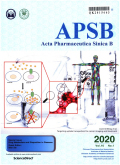- 钛学术文献服务平台 \
- 学术期刊 \
- 医药卫生期刊 \
- 药学期刊 \
- 药学学报(英文版)期刊 \
Regulatory control of the Na-Cl co-transporter NCC and its therapeutic potential for hypertension
Regulatory control of the Na-Cl co-transporter NCC and its therapeutic potential for hypertension
基本信息来源于合作网站,原文需代理用户跳转至来源网站获取
摘要:
Hypertension is the largest risk factor for cardiovascular disease,the leading cause of mor-tality worldwide.As blood pressure regulation is influenced by multiple physiological systems,hyperten-sion cannot be attributed to a single identifiable etiology.Three decades of research into Mendelian forms of hypertension implicated alterations in the renal tubular sodium handling,particularly the distal convo-luted tubule(DCT)-native,thiazide-sensitive Na-Cl cotransporter(NCC).Altered functions of the NCC have shown to have profound effects on blood pressure regulation as illustrated by the over activation and inactivation of the NCC in Gordon's and Gitelman syndromes respectively.Substantial progress has un-covered multiple factors that affect the expression and activity of the NCC.In particular,NCC activity is controlled by phosphorylation/dephosphorylation,and NCC expression is facilitated by glycosylation and negatively regulated by ubiquitination.Studies have even found parvalbumin to be an unexpected regu-lator of the NCC.In recent years,there have been considerable advances in our understanding of NCC control mechanisms,particularly via the pathway containing the with-no-lysine[K](WNK)and its down-stream target kinases,SPS/Ste20-related proline-alanine-rich kinase(SPAK)and oxidative stress responsive 1(OSR1),which has led to the discovery of novel inhibitory molecules.This review summa-rizes the currently reported regulatory mechanisms of the NCC and discusses their potential as therapeu-tic targets for treating hypertension.

推荐文章
NaCl、Na2SO4和Na2CO3对南瓜幼苗的生理胁迫效应
南瓜
NaCl
Na2SO4
Na2CO3
盐分胁迫
实验方案的设计——NaHCO3和Na2CO3混合物中Na2CO3质量分数的测定
实验目的
实验原理
实验方案设计
实验装置
实验步骤
基于NCC的图像匹配快速算法
图像匹配
归一化积相关
相似度函数
区域分割
差分
NaCl胁迫对2个菊属野生种幼苗体内K+、Na+和Cl-分布及生长的影响
菊属
盐胁迫
离子分布
生长特性
内容分析
关键词云
关键词热度
相关文献总数
(/次)
(/年)
引文网络
引文网络
二级参考文献 (0)
共引文献 (0)
参考文献 (121)
节点文献
引证文献 (0)
同被引文献 (0)
二级引证文献 (0)
1991(2)
- 参考文献(2)
- 二级参考文献(0)
1992(1)
- 参考文献(1)
- 二级参考文献(0)
1994(1)
- 参考文献(1)
- 二级参考文献(0)
1996(1)
- 参考文献(1)
- 二级参考文献(0)
1999(1)
- 参考文献(1)
- 二级参考文献(0)
2000(2)
- 参考文献(2)
- 二级参考文献(0)
2001(3)
- 参考文献(3)
- 二级参考文献(0)
2002(2)
- 参考文献(2)
- 二级参考文献(0)
2003(5)
- 参考文献(5)
- 二级参考文献(0)
2004(5)
- 参考文献(5)
- 二级参考文献(0)
2005(6)
- 参考文献(6)
- 二级参考文献(0)
2006(4)
- 参考文献(4)
- 二级参考文献(0)
2007(3)
- 参考文献(3)
- 二级参考文献(0)
2008(6)
- 参考文献(6)
- 二级参考文献(0)
2009(4)
- 参考文献(4)
- 二级参考文献(0)
2010(9)
- 参考文献(9)
- 二级参考文献(0)
2011(9)
- 参考文献(9)
- 二级参考文献(0)
2012(10)
- 参考文献(10)
- 二级参考文献(0)
2013(8)
- 参考文献(8)
- 二级参考文献(0)
2014(12)
- 参考文献(12)
- 二级参考文献(0)
2015(9)
- 参考文献(9)
- 二级参考文献(0)
2016(6)
- 参考文献(6)
- 二级参考文献(0)
2017(6)
- 参考文献(6)
- 二级参考文献(0)
2018(3)
- 参考文献(3)
- 二级参考文献(0)
2019(2)
- 参考文献(2)
- 二级参考文献(0)
2020(1)
- 参考文献(1)
- 二级参考文献(0)
2021(0)
- 参考文献(0)
- 二级参考文献(0)
- 引证文献(0)
- 二级引证文献(0)
引文网络交叉学科
相关学者/机构
期刊影响力
药学学报(英文版)
主办单位:
出版周期:
双月刊
ISSN:
2211-3835
CN:
10-1171/R
开本:
出版地:
北京市先农坛街1号
邮发代号:
创刊时间:
语种:
eng
出版文献量(篇)
688
总下载数(次)
0
期刊文献
相关文献
推荐文献
- 期刊分类
- 期刊(年)
- 期刊(期)
- 期刊推荐

 免费查重
免费查重










